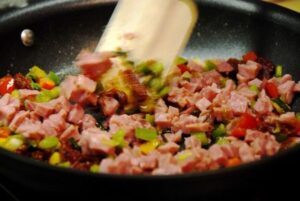Nonstick Cookware: A Sticky Situation

Do you smell that enticing aroma coming from the organic meal you have simmering in a skillet on the stove? Mmm good. While you’re anxiously waiting for your scrumptious dinner to cook, you might also be getting a big whiff of toxic fumes. The coating on oh-so convenient nonstick cookware can leach a nasty recipe of chemicals into your food and the air.
Nonstick cookware are metal pots and pans coated in a synthetic polymer called polytetrafluoroetheylene, or Teflon. When Teflon-coated cookware are heated too high, the coating begins to degrade and releases noxious chemicals into the air. Too much exposure to Teflon fumes can cause flu-like symptoms. The fumes have also been known to build up to levels high enough to kill pet birds. Poor Polly. As if that wasn’t bad enough, one of the chemicals used to make Teflon, perfluorooctanoic acid or PFOA, has been linked to cancer and birth defects in laboratory animals. Kind of gives you the heebie-jeebies to guess what it could do to you, huh?
Surprisingly, it’s not toxic to ingest particles that flake off scratched nonstick cookware because solid Teflon flakes are inert. Still, it’s pretty gross to think about.
Don’t think that you heat your nonstick too high? A 2003 study found that it only takes two to five minutes on a conventional stovetop for Teflon-coated cookware to exceed the temperatures at which it emits toxic gases.
You can always take preventative measures like not preheating nonstick cookware or not placing nonstick cookware in the oven, but why risk it? Better alternatives exist for safer cooking. If you are looking for brand recommendations, check out our non-toxic cookware guide. We’ve also listed out four types of cookware that are non-toxic below.
Four better options
1. Anodized aluminum
Like nonstick cookware, anodized aluminum cookware contains a smooth surface, perfect for sliding eggs around (and easy on the clean up). Unlike conventional nonstick cookware, the anodizing process locks in the aluminum, which makes it non-porous and non-reactive. Meaning, it can’t leach anything bad into your food. The down side? Anodized aluminum can break down over time, especially if frequently used to cook acidic foods.
2. Glass
Glass cookware won’t leak any nasty chemicals into your kitchen. Plus it’s perfect for baking your scrumptious organic goodies.
3. Cast iron
Do you have a cast iron skillet passed down from your grandmother? Then use it sister (or brother)! These durable pans can withstand high temperatures, conduct heat evenly and, with the proper seasoning technique, can improve the taste of your food. Plus, with a little TLC these pans can last a lifetime (and will never poison your air or food).
4. Stainless steel
Although stainless steel pans require a little oil to get your food sizzling, they don’t filter toxic chemicals into the air. I’ll take a bit of oil over that any day.
image: Old Shoe Woman

